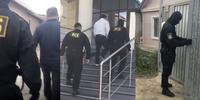Case of Aksenov in Khabarovsk
Filter
- #
According to investigators, Yevgeny Aksyonov, along with friends and acquaintances, gathers in one of the Khabarovsk conference rooms for joint reading and discussion of the Bible, chants and prayers. Investigators claim that at this event Aksyonov makes a speech on the topic of strengthening the family.
- #
Investigators are interrogating Yevgeny — so far as a witness — to find out whether he was a member of a local religious organization.
- #
Yevgeny is charged with taking part in the activities of a banned religious organization, quoting a translation of the Bible banned in Russia, while acting "deliberately", wanting "socially dangerous consequences." Aksyonov tells investigators that he is alien to the ideas of extremism. Aksyonov is taken to sign a not to leave.
- #
In the evening, the FSB searches the apartment of Yevgeniy and his family, and the security forces seize the computer's hard drive.
- #
Yevgeny is again interrogated, this time as accused of extremism. The believer does not admit guilt.
- #
The case is referred to the Zheleznodorozhny District Court of Khabarovsk for consideration on the merits. Judge Tatyana Fedorovna Kalganova will be considered.
- #
The Zheleznodorozhny District Court of Khabarovsk is hosting the first hearing in the case of Yevgeny Aksyonov, chaired by Judge Tatyana Kalganova. 15 people come to support him. Despite the fact that Russian law encourages the publicity of legal proceedings, they are not allowed into the courtroom. The judge grants the lawyer's request to postpone the hearing.
- #
Yevgeny Aksyonov expresses his attitude to the charges. He believes that in fact he is accused not of extremism, but of faith in God, because he did not commit any socially dangerous actions. He recalls that the Supreme Court banned the activities of a legal entity. Being a believer and reading the Bible is not a crime. Freedom of religious activity is guaranteed by Article 28 of the Constitution of the Russian Federation.
The prosecution begins to present its evidence. An employee of the conference room, where, according to investigators, the Bible was discussed, is being interrogated. The witness explains that Aksyonova does not know. The interrogation of the second witness begins, a man who in the past professed the religion of Jehovah's Witnesses and knows Aksyonov personally.
- #
- #
The prosecution witness, a man who formerly practiced the religion of Jehovah's Witnesses, continues to be questioned. He explained that since 2017 he has ceased to share the beliefs of Jehovah's Witnesses, so he has no information about their activities in the period after 2017. The questioning of the witness was not completed.
- #
The prosecution witness, a man who formerly practiced the religion of Jehovah's Witnesses, continues to be questioned again. The court shows him a secretly made video recording of the worship service, and the witness states that he identifies Aksyonov in the video footage. He also admits that on his own initiative he turned to the FSB and voluntarily testified against his former co-religionists in two criminal cases.
- #
Another employee of the conference room was questioned. He explained that some kind of religious event was taking place in the conference hall. He does not know Aksyonov. After that, the prosecutor begins to read out written documents, in particular, the conclusions of 4 expert opinions: religious scholar Averina O.D., psychologist Paevshchik A.A., linguist Merzlikina M.S. and sociologist Berezutsky Y.V., according to whom songs and prayers to Jehovah God were sung in the conference hall, the doctrine of Jehovah's Witnesses was spread and the Bible was used in the New World Translation, which, according to experts, is "a continuation of the activities of the religious organization of Jehovah's Witnesses." The next court hearing is scheduled for November 29, 2019 at 11:30 a.m. It is planned to interrogate a "secret" witness.
- #
The prosecutor requests 3 years of imprisonment for Yevgeniy Aksyonov to be served in a penal colony, despite the fact that he is raising two minor children. On February 14, 2020, at 11:30 a.m., Aksyonov will deliver his final speech; Perhaps the verdict will be handed down on the same day.
- #
Evgeny Aksyonov gives his last word. In an appeal to Judge Tatyana Kalganova, he poetically tells that he has become a law-abiding citizen and a good family man. Yevgeniy also shows the reasons for his faith, emphasizing that the teachings from the Bible shared by Jehovah's Witnesses have nothing to do with extremism and are filled with love for people. Aksyonov does not admit his guilt and asks the judge to acquit him. The sentencing is scheduled for 10:00 a.m. on Feb. 18.
The last word of the defendant Yevgeny Aksyonov in Khabarovsk - #
Tatyana Kalganova, judge of the Zheleznodorozhny District Court of Khabarovsk, declares Yevgeny Aksyonov guilty of extremist activities because of his religion. He was sentenced to 2 years of suspended imprisonment. In addition, he was sentenced to restriction of liberty for another 6 months, during which he cannot leave his home at night. Aksyonov himself insists on his innocence, considers the accusation false, and the court's decision unjust, and prepares an appeal.
- #
The Khabarovsk Regional Court postpones the date of the appeal hearing to May 7, 2020.
- #
Judge of the Khabarovsk Regional Court Maksim Vergasov upholds the conviction of Yevgeny Aksyonov - a sentence of 2 years of suspended imprisonment and restriction of liberty for another 6 months, during which the believer cannot leave his home at night. The verdict comes into force.
- #
The Ninth Court of Cassation, composed of the presiding judge Galina Dezhurnaya, judges Alexei Vasilyev and Elena Nikolaenko, is considering the complaint of Yevgeny Aksyonov.
Speaking before the court, the believer draws attention to the previous violation of international law, including Articles 9, 11 and 14 of the Convention for the Protection of Human Rights and Fundamental Freedoms. He also emphasizes that earlier the court in the verdict did not indicate on what basis the peaceful expression of faith in God was regarded as a crime.
However, according to the panel of judges, there were no serious violations of the criminal or criminal procedure law that entailed the cancellation or modification of the sentence against Aksyonov. The complaint was dismissed.



